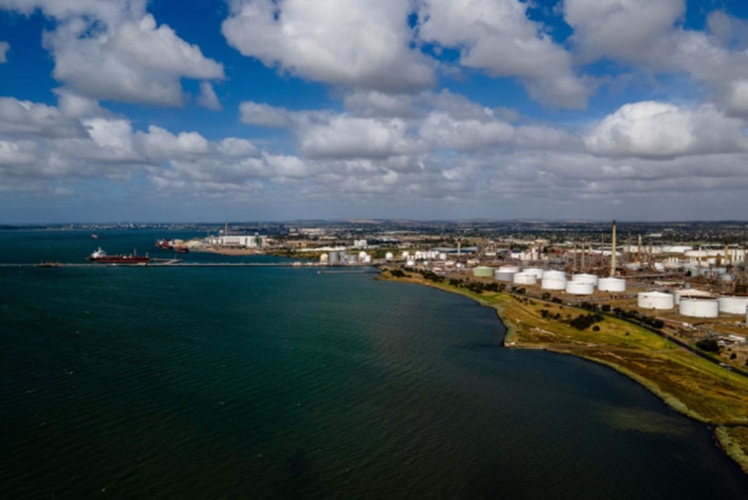An artists’ rendering of Viva Energy’s proposed energy hub.
Viva Energy will build Australia’s first public hydrogen refuelling station at its Geelong refinery site in a move aimed at capitalising on the transport and haulage industry’s expected transition to zero emission vehicles.
The refuelling station is part of a $43.3 million project – about half-funded by the Australian Renewable Energy Agency – that also involves construction of a 2 megawatt electrolyser and a financial contribution towards the funding of hydrogen-powered vehicles to be used by partners including Toll Group and Cleanaway.
“Our vision is for the site to manufacture and deliver traditional fuels, as well as offering transitional and alternative energies, playing an important role in providing energy security now and into the future,” Viva chief executive Scott Wyatt told the Australian Financial Review.
Viva said it would spend $11 million to build the service station and electrolyser as the oil refiner pushed ahead with its plan to take a lead in the refuelling of hydrogen-powered trucks and buses, and to set up a nationwide refuelling network at its existing service stations along major road transport routes between Melbourne and Sydney, and onto Brisbane.
”Viva Energy’s project is a major step to putting hydrogen-powered vehicles on the road, supporting consumer choice and reducing emissions from the heavy vehicle sector. We understand the importance of our truckies to keeping Australia moving and are supporting their technology choices for their businesses,” Energy Minister Angus Taylor said.
The 2 megawatt electrolyser will be powered by renewable energy and use recycled water from Barwon Water’s Northern Water Plant.
Mr Wyatt said hydrogen was expected to be delivered from the site in late 2023, and it would support at least 15 hydrogen-powered heavy vehicles which are on order from its partners.
“The plant, once it is complete, should be able to refill about 10 trucks every hour-and-a-half,” Mr Wyatt said.
The vehicles are expected to be deployed within the first two years of operations.
Viva’s partners will contribute $8.5 million for the purchase of vehicles and of hydrogen, with the first seven vehicles to be purchased and deployed by Toll Group, Cleanaway, ComfortdelGro Corporate Australia and Barwon Water.
Viva said some vehicles would be delivered by Hyzon Motors out of Europe. The company said it was in discussions with several other potential customers and hydrogen vehicle manufacturers.
Hydrogen transition
Hydrogen-powered vehicles account for just a tiny fraction of trucks on the road in Australia, but many analysts expect it will grow quickly as diesel vehicles are retired.
Although hydrogen-powered vehicles face stiff competition from electric types, they are typically better suited to the heavier end of the transport sector.

The Viva Energy refinery on Corio Bay. Eddie Jim
Cleanaway chief executive and managing director Mark Schubert said the company’s investment in two hydrogen trucks marked the beginning of its preparation for the transition, after determining battery-powered vehicles lacked sufficient range.
“Hydrogen is significantly more expensive. Today they are twice the cost, so the objective is about learning. But over a five-year period the cost of hydrogen trucks will come down. We want to be ready,” Mr Schubert said.
Cleanaway operates about 5000 trucks. Although hydrogen-powered vehicles are expected to compete with diesel within five years, Mr Schubert said the transition to the zero emission vehicles would probably be gradual.
With confidence in the transition building, a series of manufacturers have committed to expanding hydrogen-powered vehicle production.
Hyzon Motors – a Nasdaq-listed producer of hydrogen-powered commercial vehicles – said it would spend more than $50 million to expand production in Australia. Nexport, the country’s largest bus manufacturer, is also looking to expand.
Reshaping Geelong
The hydrogen refuelling station is part of Viva’s plan to turn its Geelong refinery site into a hub for low-carbon energy.
Under the plan, Viva will build a 15 megawatt solar farm at the refinery site to provide power for its operations and support its target to reduce greenhouse gas emissions.
The project, costing about $20 million, could be expanded to 20 megawatts later on.
Subscribe to our free mailing list and always be the first to receive the latest news and updates.
